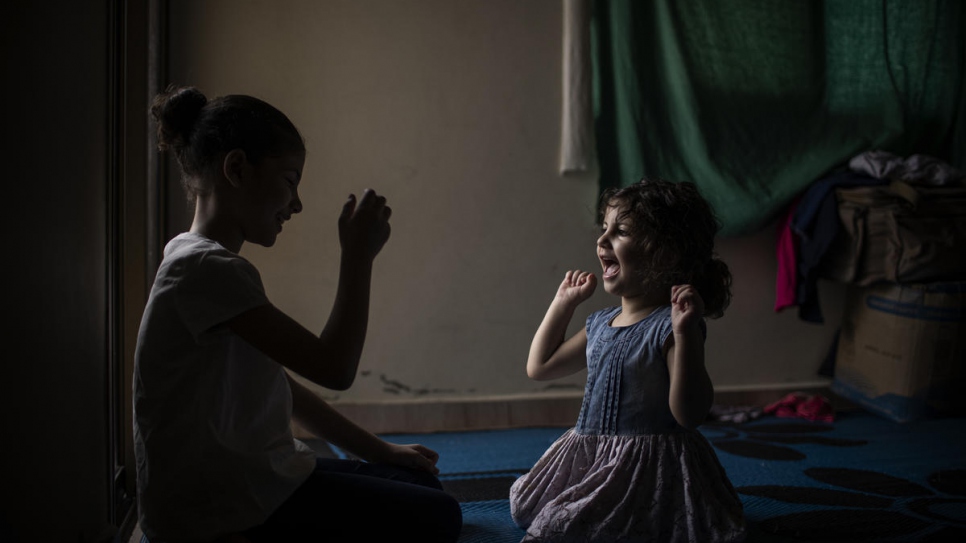Syrian family awaits end of lockdown to start new life in Norway
Airport closure put Wafaa and her family's resettlement on hold, but she hopes that once crisis eases they can leave Lebanon and her teenage son can stop work.
Syrian refugee Mohammad and his daughter Yasmine on the rooftop of their house in Barja, Lebanon.
© UNHCR/Diego Ibarra Sánchez
After surviving fourteen months living in fear and hunger during the siege of Eastern Ghouta near Damascus, Wafaa Hashim and her family were grateful just to escape with their lives when they fled the siege and made their way to Lebanon as refugees in 2014.
“When we arrived in Lebanon, it was like we moved from hell to heaven,” said Wafaa, 32, as she remembered the day the family finally made it across the border.
But after more than five years of deepening poverty and steadily deteriorating circumstances in Lebanon, familiar feelings of entrapment and despair once again began to take hold.
With Wafaa’s husband Mohammad struggling to find regular work due to an injury sustained during the siege, they are now forced to rely on the income of their 13-year-old son, Bakr, who works at a local supermarket delivering goods to customers.
"This is really hard for a child."
“When I see my son working and not studying, I feel so sad,” said Wafaa. “I look at his friends who learned to read and write, but he can't. He often comes back exhausted from work and asks me: ‘when is this going to end?’”
“His psychological state of mind isn't great,” added Wafaa. “He doesn't go out to play and he has very few friends. He spends too much time alone. I feel so sad for him, I feel he is broken because he can’t read or write. This is really hard for a child.”
The family lives in a sparsely furnished apartment in Mount Lebanon governorate, outside the capital Beirut. Bakr’s earnings barely cover the monthly rent, meaning the family often has to go without other necessities.
Recently the family had to manage without electricity for four months, as they were unable to afford the fuel to run the generator.
One evening, as she was putting her youngest children to sleep, Wafaa tried to reassure them that things would get better. “We were under a lot of pressure, we had to pay rent and couldn’t. I was joking with my daughters, telling them to sleep early as we have an interview at UNHCR the next day so that we can go abroad.”
To her surprise, Wafaa’s hopeful story came true the next day when UNHCR, the UN Refugee Agency, called her husband to tell them that the family would be interviewed by Norway for resettlement “I was completely shocked; I didn’t believe him. I thanked God we can finally get our children out.”
Following an interview with the Norwegian selection mission at the end of last year – which was held via videoconference after the delegation was unable to travel to Lebanon due to protests in the country at the time – the family was accepted and scheduled to fly out on 23 March 2020.
But the lockdown measures introduced in mid-March to prevent the spread of COVID-19 meant the family’s flights were cancelled and their resettlement put on hold.
“Being poor is hard, being vulnerable is hard. Our hopes were pinned on this trip, but it hasn’t worked out,” Wafaa said.
With many countries worldwide closing their borders in response to the pandemic, and with widespread disruption to international air traffic, in mid-March UNHCR and the International Organization for Migration (IOM) announced most resettlement departures for refugees would be put on hold, except for emergency cases.
But with restrictions starting to be lifted in some countries, last week UNHCR and IOM announced the resumption of resettlement departures as soon as the situation in each country allows. Beirut airport is due to begin partial reopening in early July.
See also: UN refugee chief Grandi and IOM’s Vitorino announce resumption of resettlement travel for refugees
While fewer than 1 per cent of the world’s refugees having the possibility to be resettled, finding a new home in a third country remains a vital and often life-saving option for some of the most vulnerable individuals under UNHCR’s mandate.
The family still hopes to travel to Norway when airports reopen and commercial flights resume.
“We hear that Norway is developed and is beautiful,” said Wafaa. “That they have respect for other people, and they respect the freedom of speech. We hope to still make it there.”
"We want to forget our past."
Wafaa dreams of educating all her children and hopes to go to school herself to study psychology. She hopes her husband can get the treatment he needs to overcome his injury there too.
The family recognizes that the postponement of their much-awaited trip is due to circumstances beyond their control, and they remain hopeful that their current predicament will not last as long as previous difficult periods in their lives.
“We put so much hope on traveling,” Wafaa said. “We are still positive we will get there once this pandemic is over and airports reopen. We want to forget our past, we got some hope with this opportunity. As they say, after hardship comes light.”





